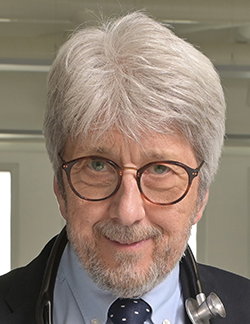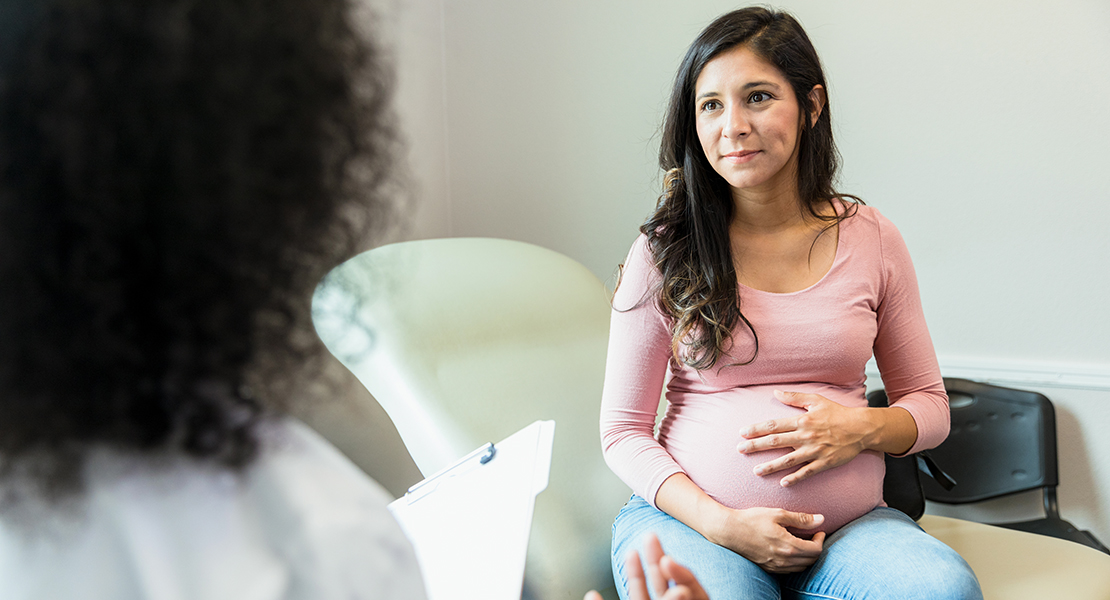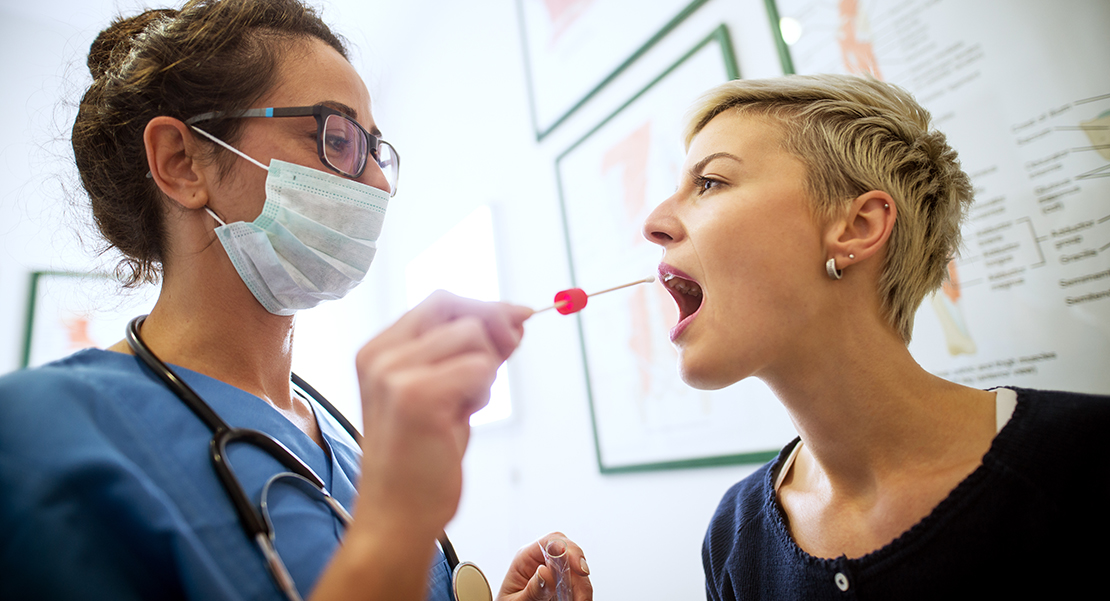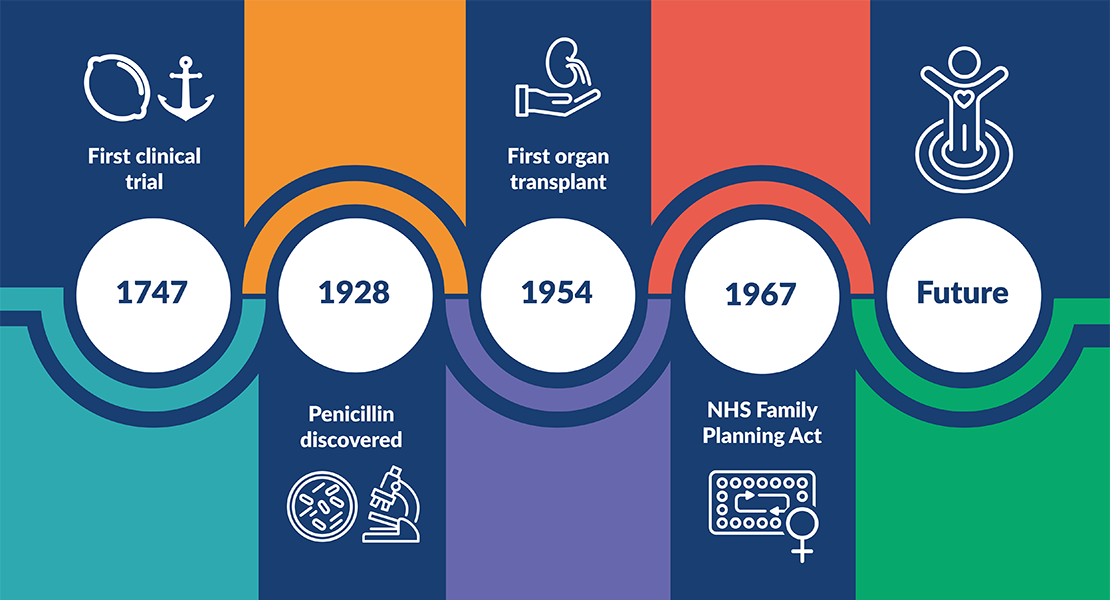 It’s over 20 years since the complete set of human genes – known as a genome – was first analysed or ‘sequenced’. Sequencing involves reading the unique code for the 3 billion building blocks that make up each individual’s genome.
It’s over 20 years since the complete set of human genes – known as a genome – was first analysed or ‘sequenced’. Sequencing involves reading the unique code for the 3 billion building blocks that make up each individual’s genome.
Former NIHR Specialty Lead for Genetics, Professor Eamonn Maher, talks us through how far our understanding of genetics has come, and how UK research is building on that initial groundbreaking discovery to diagnose and treat disease.
What are the most important research initiatives in the UK that have enabled genetic advances to move forward?
Genetic research looks for changes in our genes and tries to see which of these can be linked to specific diseases or conditions. To do this, you need very large numbers of genomes to compare, particularly if some of the conditions you’re looking for are quite rare.
This is where biobanks can be gamechangers, providing vital information for researchers. Biobanks collect hundreds of thousands of samples from patients and healthy volunteers. We’re lucky in the UK to have several important biobanks. For example, since 2006, the UK Biobank have sequenced the genes of 500,000 participants. They continue to follow up on the health of these volunteers. This helps them link changes in genes to different health conditions or diseases.
The NIHR Bioresource was set up in 2007. It recruits volunteers with rare or common diseases as well as healthy volunteers. The NIHR Rare Diseases Bioresource worked in partnership with the 100,000 Genomes project. This was set up in 2012 and has since sequenced one or more whole genomes of around 85,000 patients with cancer or rare diseases.
What have we learnt from these large-scale biobank projects so far?
These large-scale sequencing projects have helped to make the case for using ‘whole genome sequencing’ (WGS) in healthcare.
At first, because genome sequencing was very expensive and took a long time, scientists – and doctors – tended to only look at certain parts of the genome. Doctors would choose specific genes to analyse, depending on a patient’s symptoms. If that didn’t work, then they might test another set of genes. But often patients had many many genes analysed and still didn’t get a diagnosis.
Once it became affordable and quick enough, scientists began sequencing the whole genome to look for changes. For example, based on samples from around 4,000 people, researchers from the 100,000 Genomes project showed that you could identify 25% more rare diseases using WGS. Fourteen percent of these were in regions of the genome that would be missed using other sequencing methods.
Patients who received a diagnosis through the study included a 10-year-old girl, who’d been trying to get a diagnosis for 7 years. Thanks to the diagnosis, she was able to get a bone marrow transplant to cure her condition. Her siblings were also tested to ensure they didn’t have the same mutation.
Are there particular benefits from genome sequencing for parents and children?
Often developmental disorders are caused by alterations in a child’s genome that aren’t carried by either parent. By comparing all three genomes – of child and both parents – you can spot alterations in the DNA and usually reach a diagnosis. If a mutation isn’t inherited, you can also reassure parents that future children are at low risk.
One study supported by the NIHR which used this approach was the Deciphering Developmental Orders (DDD) study. The study exome sequencing (a technique to cover the parts of genes that code for proteins) to provide a diagnosis for 5,500 families. Around a quarter of children had their treatment changed as a result.
The research also identified more than 60 new conditions. While these may not be treatable, having a diagnosis can be a very positive development. It can enabling better estimates of familial risks, help families to form support groups and stimulate further research. This is particularly important in rare conditions.

Genome-wide sequencing can also help to diagnose developmental disorders during pregnancy. This was the focus of another piece of research, the PAGE study. At the time of the study, if a birth defect showed up on an ultrasound scan, only limited investigations could be carried out. This meant parents could be faced with a decision about continuing with the pregnancy with limited information on how their child might be affected.
In the PAGE study, researchers wanted to see if using more comprehensive genetic sequencing lead to a clearer diagnosis of conditions causing learning and physical disabilities that might not be diagnosable by ultrasound scans alone. They found that, there was an increased rate of diagnoses when genome-wide sequencing was added to other genetic investigations.
Thanks to these studies, comprehensive genetic testing to diagnose developmental disorders in childhood and prenatally was introduced into NHS genetics services.
Can advances in genetics help those with common conditions as well?
Yes, absolutely. For example, some of the same genes that are involved in rare, inherited forms of cancer are also involved in more common forms of the disease. There’s a rare condition which I’ve worked on called von Hippel Lindau (VHL) disease. People who have that condition have an altered copy of the VHL gene and they have a very high lifetime risk of getting kidney cancer. After we found that gene, we also found that for most people with the more common form of kidney cancers, the VHL gene is also mutated but only in their tumour tissue. Subsequently a drug was developed to counteract the effects of the VHL gene mutation and it's already approved for use in the US for treating VHL patients. It’s also showing promise for treating patients with more common kidney cancers as well.
The other big change in medicine is towards personalised treatment and this often relies on genome sequencing. Cancer tumours can look identical under the microscope, but if you sequence them, you may find different genetic alterations. Each of those alterations may affect how a patient responds to treatment.
"So, what we now think of as common diseases are already starting to be broken down into smaller groups based on genomic sequencing. This means doctors can select the treatment which is most likely to work for each individual patient."
- Prof Eamonn Maher, former NIHR Specialty Lead for Genetics
What challenges do we still face in genetic medicine?
One of the issues with the databases is they have mainly recruited white people in the US or Europe. They may not have enough genomes from people of other ethnicities to properly able to crosscheck any gene alterations in those groups. This makes it hard to know sometimes whether an alteration in a gene is in fact the cause of disease, not just a coincidence.
A UK project called Genes and Health is trying to tackle this. They are looking for 100,000 volunteers of Pakistani and Bangladeshi origin to donate their samples for genomic sequencing. The project has centres in East London, Bradford and Manchester and is planning to open another centre in Birmingham. They’ve already recruited 60,000 participants so are well on their way to the target.
How would someone get involved in genetics research?
Anyone of Pakistani or Bangladeshi origin can take part in the Genes for Health project. All they need to do is fill in a questionnaire online and send a saliva sample through the post. The NIHR Bioresource is also continuing to recruit participants with certain conditions.
Anyone who is healthy but keen to help support the big databases of genetic information can volunteer to take part in Our Future Health. This is a charity, working with the NHS, researchers and industry, aiming to collect information from up to 5 million adults across the UK. Researchers can apply to study the information and samples to make new discoveries about health and disease.
How you can get involved with research
Sign up to Be Part of Research to be contacted about a range of health and care research. Or check out our full list of studies to see if one is right for you.
And if taking part in a study doesn’t feel right at the moment there are other ways to get involved in research.








